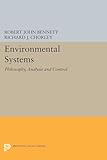Environmental Systems : Philosophy, Analysis and Control / Richard J. Chorley, Robert John Bennett.
Material type: TextSeries: Princeton Legacy Library ; 1448Publisher: Princeton, NJ : Princeton University Press, [2015]Copyright date: ©1979Description: 1 online resource (638 p.)Content type:
TextSeries: Princeton Legacy Library ; 1448Publisher: Princeton, NJ : Princeton University Press, [2015]Copyright date: ©1979Description: 1 online resource (638 p.)Content type: - 9780691628042
- 9781400867257
- Human ecology
- Human ecology.
- SOCIAL SCIENCE / Sociology / General
- Accuracy and precision
- Air pollution
- Arrow's impossibility theorem
- Autocorrelation
- Bayesian
- Bessel function
- Big O notation
- Causality
- Consideration
- Control function (econometrics)
- Control variable
- Counterintuitive
- Cross-correlation
- Decision-making
- Dynamic programming
- Economic efficiency
- Economic planning
- Ecosystem
- Emergence
- Environmental determinism
- Environmental economics
- Error term
- Estimation theory
- Estimation
- Estimator
- Explanation
- Externality
- Extrapolation
- Feed forward (control)
- Forecasting
- Genetic fallacy
- Heuristic
- High- and low-level
- Holism
- Hypothesis
- Ideal type
- Indifference curve
- Inference
- Initial condition
- Input and output (medicine)
- Instrumental variable
- Interdependence
- Inverse problem
- Isoquant
- Kalman filter
- Karush–Kuhn–Tucker conditions
- Kriging
- Lag operator
- Laplace transform
- Least squares
- Loss function
- Marginal rate of substitution
- Mathematical optimization
- Maximum likelihood estimation
- Measurement
- Natural environment
- Natural justice
- Negative feedback
- Non-renewable resource
- Nonlinear system
- Normal conditions
- Nutrient
- Observability
- Optimal control
- PID controller
- Parameter
- Pareto efficiency
- Partial autocorrelation function
- Pollutant
- Pollution
- Prediction
- Preference (economics)
- Probability
- Production–possibility frontier
- Quantity
- Result
- Scarcity
- Self-tuning
- Sensitivity analysis
- Servomechanism
- Setpoint (control system)
- Simulation
- Soil
- Special case
- State of nature
- State variable
- Steady state
- Stepwise regression
- Stochastic control
- Subsidy
- Supply (economics)
- Surplus value
- System analysis
- Tax
- Theory
- Time series
- Transfer function
- Uncertainty
- Utility
- Weighting
- 301.31/028/51
- GF41
- online - DeGruyter
| Item type | Current library | Call number | URL | Status | Notes | Barcode | |
|---|---|---|---|---|---|---|---|
 eBook
eBook
|
Biblioteca "Angelicum" Pont. Univ. S.Tommaso d'Aquino Nuvola online | online - DeGruyter (Browse shelf(Opens below)) | Online access | Not for loan (Accesso limitato) | Accesso per gli utenti autorizzati / Access for authorized users | (dgr)9781400867257 |
Frontmatter -- Contents -- Acknowledgements -- Preface -- 1. The philosophy of environmental systems -- Part I. Hard systems -- 2. Systems methods -- 3. Control systems -- 4. Space-time systems -- Part II. Soft Systems -- 5. Cognitive systems -- 6. Decision making systems -- Part III. Complex systems -- 7. Physico-ecological systems -- 8. Socio-economic systems -- Part IV. Systems interfacing -- 9. Systems interfacing -- 10. Conclusion: future problems -- Appendices -- References -- Index of persons -- Subject index
restricted access online access with authorization star
http://purl.org/coar/access_right/c_16ec
Here is an indispensable text and reference book for anyone interested in a systems approach to environmental studies. It will be useful not only to geographers but also to ecologists and other environmental scientists; planners; economists and other social scientists; philosophers; and applied mathematicians.Bennett and Chorley's book has a number of broad aims: first, to employ the systems approach to provide an interdisciplinary focus on environmental structures and techniques; second, to use this approach to aid in developing the interfacing of social and economic theory with physical and biological theory; and third, to investigate the implications of this interfacing for human response to current environmental dilemmas, and hence to expose the technological and social bases of values which underlie our use of natural resources.Interpreting the "environment" so as to embrace physical, biological, man-made, social, and economic reality, the authors show that the systems approach provides a powerful vehicle for the statement of environmental situations of ever-growing temporal and spatial magnitude, and for reducing the areas of uncertainty in our increasingly complex decision making arenas.Originally published in 1979.The Princeton Legacy Library uses the latest print-on-demand technology to again make available previously out-of-print books from the distinguished backlist of Princeton University Press. These editions preserve the original texts of these important books while presenting them in durable paperback and hardcover editions. The goal of the Princeton Legacy Library is to vastly increase access to the rich scholarly heritage found in the thousands of books published by Princeton University Press since its founding in 1905.
Mode of access: Internet via World Wide Web.
In English.
Description based on online resource; title from PDF title page (publisher's Web site, viewed 03. Jan 2023)


